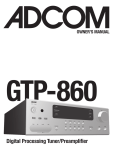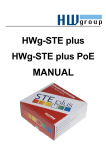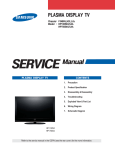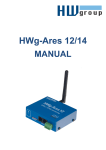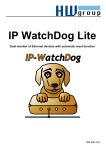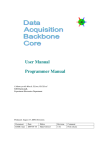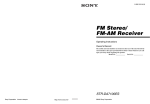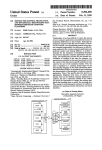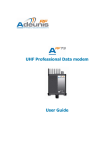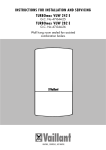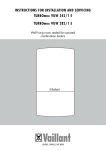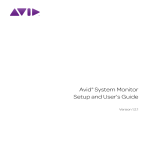Download HWg-PWR Manual
Transcript
HWg-PWR 3/12/25 MANUAL HWg-PWR 3 / 12 / 25 MANUAL HW group Package contents A complete shipment contains the following items: HWg-PWR25 (HWg-PWR12) unit Printed manual + datasheet Safety information The device complies with regulations and industrial standards in force in the Czech Republic and the European Union. The device has been tested and is supplied in working order. To keep the device in this condition, it is necessary to adhere to the following safety and maintenance instructions. HWg-PWR connects directly to a 230VAC supply; therefore, it should be installed by qualified personnel only! Using the device in a manner other than prescribed by the manufacturer may cause its safeguards to fail! The power supply outlet or disconnection point must be freely accessible. The device must not be used under any of the following conditions: The device is noticeably damaged The device does not function properly Unfastened parts can move inside the device The device has been exposed to moisture or rain The device has been serviced by unauthorized personnel The power adapter or power supply cable are noticeably damaged If the device is used in a manner other than designed for, the protection provided by the device may fail. The local electrical system must include a power switch or a circuit breaker and overcurrent protection. If you have any problems with installing or operating the device, please contact technical support: HW group s.r.o. http://www.hw-group.com Email: [email protected] U Pily 3 143 00 Praha 4 Czech Republic Tel. +420 222 511 918 When contacting technical support, please keep at hand the exact type of your device (at the type plate) and, if possible, the firmware version (see later in this manual). September 2013 www.HW-group.com page 2 HWg-PWR 3 / 12 / 25 MANUAL HW group Table of Contents Package contents ............................................................................................................................................. 2 Safety information ........................................................................................................................................... 2 What is HWg-PWR 3 / 12 / 25.......................................................................................................................... 4 Usage examples .......................................................................................................................................... 4 Basic features of HWg-PWR12/25 ................................................................................................................... 5 Description of connectors and connections .................................................................................................... 6 LED indicators ............................................................................................................................................. 6 Restoring factory defaults ........................................................................................................................... 7 HWg-PWR wiring ........................................................................................................................................ 7 Technical specifications ................................................................................................................................... 8 First steps......................................................................................................................................................... 9 1) Connecting the cables ............................................................................................................................. 9 2) Configuring the IP address – UDP Config ................................................................................................ 9 3) WWW interface of the device .............................................................................................................. 10 Adding connected meters and measured values ........................................................................................... 11 Automatic discovery of meters: ................................................................................................................ 12 Activating and adding discovered meters to HWg-PWR ........................................................................... 14 WWW interface ............................................................................................................................................. 16 Home tab .................................................................................................................................................. 16 Graph tab .................................................................................................................................................. 17 General Setup tab ..................................................................................................................................... 19 SNMP tab .................................................................................................................................................. 20 ModBus TCP Server ................................................................................................................................... 22 E-mail tab .................................................................................................................................................. 23 Time tab .................................................................................................................................................... 25 Záložka Remote SMS ................................................................................................................................. 26 Input tab ................................................................................................................................................... 27 Portal ........................................................................................................................................................ 28 Device tab ................................................................................................................................................. 29 System tab ................................................................................................................................................ 34 Meter types ................................................................................................................................................... 39 Internal memory size ..................................................................................................................................... 39 Datalog format of devices HWg-PWR and HWg-Ares .................................................................................... 40 Mechanical ................................................................................................................................................ 42 Accessories .................................................................................................................................................... 44 Manufacturer................................................................................................................................................. 44 September 2013 www.HW-group.com page 3 HWg-PWR 3 / 12 / 25 MANUAL HW group What is HWg-PWR 3 / 12 / 25 The HWg-PWR is an Ethernet-enabled device for remote monitoring and metering of electricity, heat, water or gas consumption using electricity, water, gas, heat, or other meters equipped with the M-Bus interface. In addition to metering, the device also supports alarming through e-mail or SNMP traps whenever allowed values are exceeded. HWg-PWR is designed for remote reading of values from meters equipped with the M-Bus interface. Each meter can provide multiple variables, depending on the meter type and model. Typically, electricity meters provide the total electricity consumption and also the immediate value at the time of reading, line voltage and/or line current; water meters indicate total water consumption as well as immediate consumption or liquid flow rate; and so on. Note: HWg-PWR is designed to be universal; hence, all discovered values are read out from every connected meter, until a specified limit is reached. To improve user comfort, it is possible to enable or disable each discovered value (disabled value is hidden from view), and to turn on or off the recording of measured readings for each enabled value (in order to increase the available recording time for the remaining values). The M-Bus protocol also allows reading value names, units of measurement, or tariff information from the meters. The user can customize all of these data (e.g. change the unit of measurement or its exponent). Usage examples Remote monitoring of electricity meters in small server rooms and BTS Monitoring of energy consumption in rented premises Reading out energy consumption in remote or inaccessible areas Control over energy costs Checking for individual line overloads in three-phase wirings Checking for undervoltage in electric wirings Monitoring the flow of liquids September 2013 www.HW-group.com page 4 HWg-PWR 3 / 12 / 25 MANUAL HW group Basic features of HWg-PWR 3 / 12/ 25 Ethernet: RJ45 (100BASE-TX) WEB: Embedded WEB server / GUI M-Bus meters: up to 3 / 12 / 25 M-BUS meters (electricity, gas, ...) Various values: up to 100 various values (independent from the connected meters) Automatic detection of meters and supported values 8x 110/230V voltage inputs (phase detection - common PE) for any use Logging of measured values & plot charts: Logs up to 170,000 values Configuration of allowed ranges for measured values Configuration of the unit of measurement and the exponent Conversion of measured values to currency Supports M-Bus primary and secondary addressing Configuration of remote primary M-Bus address Periodic submission of measured values over HTTP (HWg-PUSH) Periodic submission of measured values by e-mail Periodic e-mailing of differences in measured values (day, week, month, year) Periodic e-mailing of differences in measured values DIN rail mount with a power supply for M-BUS M2M communication protocols: SNMP, XML, Modbus/TCP Support for sending alarm SMS through Poseidon SMS GW (netGSM) Response to thresholds: SNMP trap, Email, netGSM Support for programmers: HWg SDK Supported software o HWg-PD Trigger: Control of other IP devices, alarm redirection to SMS o HWg-PDMS: Logging, export to MS Excel o >> Third-party SNMP software (HP OpenView, IBM Tivoli, Nagios, Zabbix, Monitor one, The Dude, Paessler IPCheck, Ipswitch WhatsUp, Axence nVision, CBR little:eye, LoriotPro, GFi NSM, SNMPc 7, CA NSM, ActiveXperts NM, Intellipool NM, MSC Operations Manager 2007) * Displayed variables depend on the actual meter September 2013 www.HW-group.com page 5 HWg-PWR 3 / 12 / 25 MANUAL HW group Description of connectors and connections LED indicators Power (green) – lights up when the device is powered. Alarm (red) – lights up whenever a monitored variable is in alarm. M-Bus (blue) – flashes whenever M-Bus communication takes place. Status (green) – HWg-PWR status. o Solid on – HWg-PWR is in regular operation. o Slowly flashing – HWg-PWR is starting up. o Rapid flashing – firmware is being uploaded. Link (amber) – flashes whenever communication takes place over the Ethernet interface. September 2013 www.HW-group.com page 6 HWg-PWR 3 / 12 / 25 MANUAL HW group Default switch: Restoring factory defaults Press and hold the Reset (Default switch), connect power, and hold the switch pressed for 10 more seconds. The HWg-PWR resets itself to factory defaults. Be careful when working with HWg-PWR in a distribution box. HWg-PWR wiring September 2013 www.HW-group.com page 7 HWg-PWR 3 / 12 / 25 MANUAL HW group Technical specifications Ethernet port + Interface RJ45 (10BASE-T / 100BASE-Tx) + Compatibility Ethernet: Version 2.0/IEEE 802.3 + Supported protocols IP: ARP, TCP/IP (HTTP, SMTP, Modbus/TCP), UDP/IP (SNMP, SNMP Traps, DHCP, SNTP) + SNMP Ver:1.00 compatible, partial ver. 2.0 implementation M-Bus + M-Bus meters HWg-PWR 3 = Max 3 meters HWg-PWR 12 = Max 12 meters HWg-PWR 25 = Max 25 meters + M-Bus power load Max. 25 connected meters (EN 13757-2) Environment + Operating -5 to +50 °C (+23 to +122 °F) / 5 to 95 %RH + Storage -5 to +75 °C (+23 to +167 °F) / 5 to 95 %RH LED indicators + POWER (green) lights up when the device is powered + LINK (red) flashes whenever communication takes place over the Ethernet interface + Status (red) HWg-PWR status: Solid on – HWg-PWR is in regular operation Slowly flashing – HWg-PWR is starting up Rapidly flashing – firmware is being uploaded + Alarm (red) lights up whenever a monitored variable is in alarm + M-Bus (amber) flashes whenever communication takes place over M-Bus Buttons + Default switch When depressed at power up, resets the device to factory defaults Digital Inputs + Ports L IN1 – L IN8 + Type 110/230V AC voltage input for the phase failure detection + Impedance 120kOhm Miscellaneous + Supply voltage 110/230 V AC - 10VA; terminal block + Dimensions 143 x 90 x 57 [mm] + Fixing DIN rail; device is intended for installation into a distribution box + Mass 390 g + Protection 200mA fuse – T200L September 2013 www.HW-group.com page 8 HWg-PWR 3 / 12 / 25 MANUAL HW group First steps 1) Connecting the cables HWg-PWR connects directly to a 110/230VAC supply; therefore, it should be installed by qualified personnel only! Connect the unit to the Ethernet (a patch cable to a switch, or a cross-over cable to a PC). Connect the M-Bus with meters. Pay attention to the polarity! Connect HWg-PWR to the electrical network. The green Power LED lights up. If the Ethernet connection works properly, the LINK (amber) LED lights up after a short while, and then flashes whenever data transfer takes place (activity indication). After power up, the amber LINK LED flashes rapidly to indicate IP address negotiation over DHCP. The blue M-Bus LED indicates communication over the M-Bus. 2) Configuring the IP address – UDP Config UDP Config utility – root directory of the supplied CD (Windows and Linux versions). Available for download at www.HWgroup.com Software > UDP Config. Click the icon to launch UDP Config. The program automatically looks for connected devices. To search for devices, click the Find Devices icon. The program searches for devices in your local network. Double-click a MAC address to open a basic device configuration dialog. Configure the network parameters IP address / HTTP port (80 by default) Network mask Gateway IP address for your network Device name (optional) Click the Apply Changes button to save the settings. September 2013 www.HW-group.com page 9 HWg-PWR 3 / 12 / 25 MANUAL HW group Restoring factory defaults Right-click a device MAC address. Within 60 seconds after powering up the unit, factory defaults can be restored using UDP Config. Disconnect power, press the Default switch, power up the device and wait for 10 seconds. Release the switch. The device is ready in the factory default configuration. 3) WWW interface of the device To open the WWW interface of the device: Enter the IP address into a web browser Click the IP address in UDP Config Click the underlined IP address in UDP SETUP September 2013 www.HW-group.com page 10 HWg-PWR 3 / 12 / 25 MANUAL HW group Adding connected meters and measured values Start the WWW interface of HWg-PWR and go to the Device menu. The list of detected meters is empty. Individual meters are always added to HWg-PWR manually. A tool for automatic discovery of meter addresses (only finds meter addresses, does not add them to the system) is also available in the Mbus Scan submenu: Note: If you know your meter parameters, add the meters directly using Manual Add. September 2013 www.HW-group.com page 11 HWg-PWR 3 / 12 / 25 MANUAL HW group Automatic discovery of meters: 1. At the Device Base Parameters page, fill in the M-Bus Scan section: - 2. 3. 4. 5. 6. Serial Baudrate – Communication speed. The default is 2400 but this can differ for various meters – see the meter documentation. - Serial Parity – Communication parity. The default is Even but this can differ for various meters – see the meter documentation. Click Scan. The M-Bus Device Scan Status section displays the discovery progress (Actual scan state) and discovered meters (Found Device). After the scan is complete, Actual scan state changes to Stopped. Discovered meters can be immediately activated and further configured using the Edit or Add button in the Action column. Repeat the action to add more meters. September 2013 www.HW-group.com page 12 HWg-PWR 3 / 12 / 25 MANUAL HW group Note: If HWg-PWR does not find any connected meters, re-check the M-Bus connection (in particular its polarity) and the baudrate and parity configuration, or try to look up these values in the documentation of your meter. Repeat the search until you find all meters. When only some of the meters are found but not all, the problem may be in different communication parameters. Repeat the search with other Serial Baudrate and Serial Parity settings. September 2013 www.HW-group.com page 13 HWg-PWR 3 / 12 / 25 MANUAL HW group Activating and adding discovered meters to HWg-PWR 1. In the Device menu, select the desired meter. The Edit xMeter section displays. 2. Turn on the meter in the system (change Enable to Enable). 3. Click Save to save your changes. 4. The PRI Address, SEC Address, Medium and Manufacturer fields are retrieved automatically and displayed when the page is refreshed. 5. The Use Address option configures the addressing mode (Primary – shorter primary MBus address; Secondary – unique secondary address). For battery-powered meters, we recommend to use the primary address. 6. Meters of the same type and by the same manufacturer are often supplied with the same Primary address, which therefore cannot be used for addressing. The PRI address field allows changing the primary address – useful for battery-powered meters. 7. The Name field allows assigning a custom name to the meter (Home, Office, RACK1, etc.) 8. Meter M-Bus Read period sets the interval for reading out the values from the meter. The default is 30s. For battery-powered meters, it might be advisable to set a longer period. For details, see Meter types. 9. Now select the Scan Value submenu of the corresponding meter (from the menu). 10. A list of values provided by the meter is displayed. Individual values can be turned on (Enable) and off (Disable): September 2013 www.HW-group.com page 14 HWg-PWR 3 / 12 / 25 MANUAL HW group 11. Click Save to save your changes. Important: In order to find meter variables, the meter must be enabled and saved. It is not possible to scan values without saving the meter configuration first! Repeat steps 1 to 3 to add all required meters. September 2013 www.HW-group.com page 15 HWg-PWR 3 / 12 / 25 MANUAL HW group WWW interface Home tab The Home tab displays current readouts of all enabled values of a meter, together with status symbols. The value is within its allowed range (Saferange) The value is out of its allowed range (Saferange) M-Bus communication error – meter stopped responding September 2013 www.HW-group.com page 16 HWg-PWR 3 / 12 / 25 MANUAL HW group Graph tab The Graph tab lets you plot a graph of the measured values. When this function is selected, all stored data from the device are read into the web browser. This operation can take some time. Click and drag inside the graph to see a selected portion. To restore, use the 100% button or the mouse wheel. September 2013 www.HW-group.com page 17 HWg-PWR 3 / 12 / 25 MANUAL HW group Graph Config tab Configures the logging parameters common for all measured values. Period – Period for storing to the memory. If the Period is shorter than the Meter MBus Read period, the most recently retrieved data are stored multiple times. Number Of Values – Number of currently logged values. The more values, the shorter log capacity. Logging time – Shows the log capacity (as time) according to current settings. Useful for log configuration or downloading. Erase datalog – Erases all measured data. All logged history is lost. September 2013 www.HW-group.com page 18 HWg-PWR 3 / 12 / 25 MANUAL HW group General Setup tab The General Setup tab is used to configure basic operating parameters of HWg-PWR. Base section Device Name – Custom name for the HWg-PWR unit. Allows distinguishing individual units in a network. Maximum device name length is 16 characters. WWW Info Text – Custom text in the WWW interface footer. Useful for contact information about the operator of that particular HWg-PWR, if the device is accessible on a public IP. Periodic restart – Enables periodic restart of HWg-PWR to prevent problems in noisy Ethernet networks or to limit the consequences of hacker attacks. Network section DHCP – Enables IP address assignment by a DHCP server, if available. Ask your network administrator if unsure about the correct setting. IP Address – IP address of HWg-PWR. Assigned by your network administrator. Network Mask – Network mask. Assigned by your network administrator. Gateway – IP address of the default gateway. Assigned by your network administrator. DNS Primary / DNS Secondary– IP address of your DNS server. Assigned by your network administrator. HTTP Port – Port number where the built-in WWW server listens. Changing the port number is useful in situations where multiple HWg-PWR units need to be accessible from an external network through a router. Ask your network administrator if you need to change this value. The default port is 80. Security: Device Admin section Username / Password – User name and password for securing access to HWg-PWR. September 2013 www.HW-group.com page 19 HWg-PWR 3 / 12 / 25 MANUAL HW group SNMP tab The SNMP tab is used to configure SNMP communication parameters and target destinations for SNMP Trap alarms. General SNMP Settings section System Name – Name of HWg-PWR within SNMP. System Location – Location of HWg-PWR within SNMP. System Contact – Contact info of the HWg-PWR administrator within SNMP. SNMP port – Port number for SNMP communication. The default is 161. SNMP Access section Community – Name of the SNMP community for accessing HWg-PWR over SNMP. Two communities can be defined. Each Community can have the following permissions defined: o Read o Write SNMP Trap Destination section Destination – Index of the target destination for SNMP traps. Only A can be set, other indexes are reserved for future use. Community – Name of the Community where the SNMP trap is sent. IP Address – Target IP address for SNMP Traps. Port – Target port for SNMP Traps. Default is 162. Enable – Activation of the target destination. Useful for disabling all SNMP traps without regard to the settings for individual values. September 2013 www.HW-group.com page 20 HWg-PWR 3 / 12 / 25 MANUAL HW group Show OID keys table This function prints the entire tree of variables with their full SNMP OID and type explanation. The MIB file for connecting the HWg-PWR to third-party monitoring systems is available under the Download MIB file link. September 2013 www.HW-group.com page 21 HWg-PWR 3 / 12 / 25 MANUAL HW group Modbus TCP Server HWg-PWR can supply data to SCADA systems using the ModBus/TCP protocol. ModbusTCP Enable – Enables the ModBus/TCP protocol. ModbusTCP Port – Port for the Modbus/TCP protocol (default is 502). Show Modbus Register Map This function prints the entire tree of variables with all individual ModBus registers and data types. September 2013 www.HW-group.com page 22 HWg-PWR 3 / 12 / 25 MANUAL HW group E-mail tab The E-mail tab is used to define the e-mail server and the parameters for sending alarm emails (beginning or end of an alarm). HWg-PWR only supports unencrypted SMTP connections. Email Settings section SMTP Server – IP address or domain name of your SMTP server. SMTP port – Port number where the SMTP server listens. The default is 25. Authentication – Enables authentication. Check this box if your SMTP server requires authentication. Username – Username for authentication to the SMTP server. If the Authentication box is not checked, this field is irrelevant. Password – Password for authentication to the SMTP server. If the Authentication box is not checked, this field is irrelevant. Importance – Sets the e-mail message priority. This is important for filtering and further processing of alarm messages. FROM – E-mail address of the sender, that is, the HWg-PWR unit. The address may be necessary for the SMTP server and can be used to identify the HWg-PWR unit, or for filtering and further processing of alarm messages. Subject – E-mail subject. Contents of this field can be used to identify the HWg-PWR unit, or for filtering and further processing of alarm messages. TO – E-mail address of the recipient of alarm messages. Only one e-mail address can be entered. CC – E-mail address of the recipient of a copy of the alarm message. Only one e-mail address can be entered. The To and CC fields cannot accept distribution lists or multiple e-mail addresses. If you need to send alarm messages to more recipients, ask your SMTP server administrator to create a distribution list accessible through a single e-mail address. Send Test Email section After configuring Email Settings, use this button to send a test e-mail. September 2013 www.HW-group.com page 23 HWg-PWR 3 / 12 / 25 MANUAL HW group Periodic Email Configures the period for sending non-alarm messages. Periodic Data mail – Periodically e-mails the log of measured values. The log only contains values which have logging enabled! o Datalog file type – Select datalogs type – CSV or BIN (Binary – see chapter Datalog format ) Periodic Diferencial Mail – Periodically e-mails the differences of the measured values for the given interval, that is, daily, weekly or monthly consumption. Warning – only values with enabled periodic e-mailing are sent. September 2013 www.HW-group.com page 24 HWg-PWR 3 / 12 / 25 MANUAL HW group Time tab The Time tab is used to configure system time and automatic synchronization with a timeserver. SNTP Setup section SNTP Server – IP address or host name of the time synchronization server. Default is time.nist.gov. Time Zone – Timezone where HWg-PWR is located. Used to set correct system time. Necessary for correct logging of measured values. Summertime – Enables daylight savings time. Used to set correct system time. Necessary for correct logging of measured values. Interval – The period for synchronizing time with the server. SNTP Synchronize section The Sync button immediately synchronizes time with the time server. Can be used to test the settings. Time Setup section The Time Setup section lets you enter current date and time manually, when synchronization with a time server is unavailable. September 2013 www.HW-group.com page 25 HWg-PWR 3 / 12 / 25 MANUAL HW group Remote SMS tab This tab is used to setup the alarm SMS parameters. The SMS messages are sent through a remote SMS gateway with the netGSM protocol support. Remote SMS setup section Remote SMS Gateway – Enables / disables this function IP Address – Remote gateway IP address Port – TCP port that the gateway listens to Target number – SMS phone number Username – Username for the remote gateway, can be skipped Password – Password for the remote gateway, can be skipped SMS Normal Text – Macro to create the SMS that announces an end of alarm SMS Alarm text – Macro to create the SMS that announces an alarm Send Remote SMS testing messages section Test Normal – Sends a test SMS announcing the end of alarm Test Alarm – Sends a test SMS announcing an alarm September 2013 www.HW-group.com page 26 HWg-PWR 3 / 12 / 25 MANUAL HW group Input tab This tab is used to configure the parameters of dry contact inputs. Input Dry Contacts section For each input, you can define: Name – Name of the input, shown at the homepage and in alarm messages. State Name – Name of the respective dry contact state at the homepage and in alarm messages. o Log. 0 – Open – Name of the logic low (contact open, idle) state. o Log. 1 – Close – Name of the logic high (contact closed) state. Alarm Alert – Defines the alarm state. o Disabled – Alarm function is disabled. o 0 (Active if Log.0) – Alarm when the contact is open. o 1 (Active if Log.0) – Alarm when the contact is closed. E-mail – Determines if an e-mail is sent when the Alarm state is activated or deactivated for the respective input. SNMP Trap – Determines if a SNMP Trap is sent when the Alarm state is activated or deactivated for the respective input. September 2013 www.HW-group.com page 27 HWg-PWR 3 / 12 / 25 MANUAL HW group Portal This tab is used to setup parameters to send the data to a remote portal using HWg-PUSH. You can find out more about the protocol and portal solution support here: http://www.hwgroup.com Portal Config section Portal – Enables / disables this function Push Period – Period in which the data is pushed to the remote server. This is received from the portal. Server address – Complete URL of the remote server IP Port – Port that the portal listens to Username – Username to assign the HWg-PWR to a user. You will get this from the portal administrator. Password – Password to assign the HWg-PWR to a user. You will get this from the portal administrator. Portal Message section Information from the portal such as links to graphs etc... This depends on the type of portal you are using. September 2013 www.HW-group.com page 28 HWg-PWR 3 / 12 / 25 MANUAL HW group Device tab This tab is used to discover connected meters (Device), set their parameters, and to subsequently find and configure the values provided by individual meters. Device List section The Device List section lists all connected meters together with their type (Medium) and M-Bus address (Address). To edit a meter, click “Edit” on the corresponding line. Each meter is assigned a unique ID within HWg-PWR for use in XML and SNMP communication. September 2013 www.HW-group.com page 29 HWg-PWR 3 / 12 / 25 MANUAL HW group Edit xMeter section Enable – Enables or disables the meter within HWg-PWR. When a meter is disabled, values are not detected or read but the configured parameters remain stored. This can be used to temporarily turn off the reading and recording for a particular meter (during maintenance etc.) The Use Address option configures the addressing mode (Primary – shorter primary MBus address; Secondary – unique secondary address). For battery-powered meters, we recommend to use the primary address. PRI Address – Primary address on the M-Bus. The address is entered as one byte (0255). Meters of the same type and by the same manufacturer are often supplied with the same Primary address, which therefore cannot be used for addressing. The field allows changing the primary address as a convenience for battery-powered meters. Secondary Address – Secondary address on the M-Bus. This address is used to identify a meter if there are more meters with the same primary address (Address field) on the bus. Secondary address is not user-changeable. Serial Baudrate – M-Bus communication speed for the particular meter. By default, 2400 Baud is configured. Meters with different communication speeds can coexist on a single bus; this parameter sets the speed for the particular meter. Serial Parity – M-Bus communication parity. As with the baudrate, parity can be specified individually for each meter. Meter M-Bus Read period sets the interval for reading out the values from the meter. The default is 30s. For battery-powered meters, it might be advisable to set a longer period. For details, see Meter types. Name – Meter name. Identifies the meter within HWg-PWR – in graphs, XML and SNMP – using a custom name (Home, Office, RACK1, etc.). Scan Value – Reads the values and their parameters from the meter. See First Steps. September 2013 www.HW-group.com page 30 HWg-PWR 3 / 12 / 25 MANUAL HW group Value Table section The Value Table section displays information about discovered values from a particular meter – their names (Name), units of measurement (Unit), current readings (Value), and whether logging is enabled. Each value is assigned a unique ID within HWG-PWR for use in XML and SNMP communication. To edit a variable, its parameters and properties, click “Edit” on the corresponding line. September 2013 www.HW-group.com page 31 HWg-PWR 3 / 12 / 25 MANUAL HW group Edit y.Value on x.Meter tab State section State – Turns on/off the respective variable. Logging section Logging - Enables logging of values into the internal memory, at intervals specified at the Log tab. When logging is enabled for fewer variables, more records can be stored. Value section Name – Value name. Identifies the value (variable). Unit – Physical unit of measurement. Identifies the unit of the value being measured. Together with its exponent, it can be used to convert the value to a custom format and unit (W/kW, kWh/MWh, dm3/l and so on). Exponent – Allows you to change the order of the displayed unit of measurement. Tarif – Identifies the tariff in multi-tariff meters. Zero Offset – Bias. Allows a modification of the displayed value by adding (subtracting) a fixed number. Typically used to monitor differences for a given time period. Value From MBUS – RAW data received over M-BUS. Final Value – Resulting value after processing the received data, exponent and unit of measurement. September 2013 www.HW-group.com page 32 HWg-PWR 3 / 12 / 25 MANUAL HW group Billing section Billing – Enables conversion of the measured value to currency (creating a virtual value tied to the actual value). Further on, this variable will be reported in terms of the measured quantity as well as its monetary equivalent. This conversion will be included in alarm and periodic messages as well as in XML files and the device homepage. Money Convertion – Sets the conversion factor and currency for conversion of values to money. Periodic Diferencial Mail – Enables inclusion of the value to the periodic e-mail with differences. Alarming section Enable SaveRange – Enables the monitoring function for the current value and its allowed range. This can be used to monitor if a value (line current, flow rate, etc.) exceeds the allowed range, and alert to excessive (or suspiciously low) energy consumption in order to avoid more serious problems. SafeRange Hi – Upper limit. Alarm occurs if the measured value exceeds the value specified here. SafeRange Lo – Lower limit. Alarm occurs if the measured value falls below the value specified here. Saferange Hyst – Allowed hysteresis. Suppresses false alarms if the measured value oscillates near the threshold. The hysteresis only applies in the direction into the SafeRange. That is, alarm always starts when SafeRange Hi or SafeRange Lo is crossed but only ends when the threshold plus (or minus) Saferange Hyst is reached. E-Mail if Change State – Specifies whether an e-mail should be sent whenever an Alarm begins or ends. SNMP Trap if change state – Specifies whether a SNMP Trap should be send whenever an Alarm begins or ends. September 2013 www.HW-group.com page 33 HWg-PWR 3 / 12 / 25 MANUAL HW group System tab The System tab is used to access the most important system information, such as uptime or firmware version, and to perform operations such as HWg-PWR restart or firmware update. Download section Backup configuration – Click to save the current HWg-PWR configuration. Saved configuration can be later restored. (http://hwg-pwr.hwg.cz/HWg-PWR_Config.bin) Online values in XML – Address of a XML file with current readouts. Intended for automated processing at remote servers. (http://hwg-pwr.hwg.cz/values.xml) SNMP MIB Table – Address of the MIB file that contains the definitions of SNMP variables. (http://hwg-pwr.hwg.cz/HWg-PWR.mib) TXT list of common SNMP OIDs – Overview of the most important OIDs from the MIB table. (http://hwg-pwr.hwg.cz/HWg-PWR_OID.txt) Data Log CSV Format – Address of a CSV file with a logged history of readouts. Intended for automated processing at remote servers. (http://hwgpwr.hwg.cz/log.csv) Factory Default section Restores factory default settings. The default IP address is 192.168.1.99 and no user name or password is defined. September 2013 www.HW-group.com page 34 HWg-PWR 3 / 12 / 25 MANUAL HW group Connecting to the Portal 1) First connect the device to your network and set the network parameters (First Steps chapter in the user manual). 2) Then open the WWW setup on the Portal tab. In the Portal Config section, please tick the Portal option, save the changes with a Save button and then press the Manual Push button. In case you have an older FW version or any changes to the settings have been done, please check that Server Adress field contains an address http://sensdesk.com/portal.php. September 2013 www.HW-group.com page 35 HWg-PWR 3 / 12 / 25 MANUAL HW group 3) By clicking a link SensDesk.com: register your IP sensor, you will be redirrected to a login page of SensDesk.com portal. 4) In case you already have a user account, please enter your login details and the device will be automatically assigned to your account. If you do not have a SensDesk account yet, click the Register to Portal link and a registration form will be shown. September 2013 www.HW-group.com page 36 HWg-PWR 3 / 12 / 25 MANUAL HW group 5) Enter the login details for your new account and a correct e-mail address. This e-mail address has to be unique for the server (cannot be already registered by another user). Company name allows you to create your own 3rd level domain (usually company.sensdesk.com). A user name will be used if the Company name field is left empty. After clicking the Create new account button, a user account will be created and at the same time a confirmation email is sent to the entered e-mail address. This e-mail contains a confirmation link which has to be used in order to activate the account. 6) By activating the account, you will be redirected to the Invitation page of the device. At this moment, the data-sending period is set to 10 seconds to show the sensors functionality. This page is active only for approximately 15 minutes after the activation, then the logging period changes to 15 minutes. September 2013 www.HW-group.com page 37 HWg-PWR 3 / 12 / 25 MANUAL HW group 7) If you check your user account configuration (My Account link), you will find your Push Device Password. This password, together with your login name, identifies the device in communication with your account and in communication of mobile applications with SensDesk. The password cannot be changed and for a security reason it is different to the login password. 8) PUSH Device Password can be used in devices to skip the logging procedure during assigning the device to your portal account, or in mobile applications: P o r t a l f u n c t i o n p Periodically sends the data to a remote server and the sending period is set by this server. AutoPush is a function allowing unusual measured data sending, beside the periodical logging, in case that the value change is higher than the AutoPush delta parameter. September 2013 www.HW-group.com page 38 HWg-PWR 3 / 12 / 25 MANUAL HW group Meter types With respect to the mode of operation, meters can be classified as: - Mains-powered (electricity meters) - Battery-powered (heat meters, water meters, gas meters etc.) Manufacturers of battery-powered meters may restrict the number of read operations within a certain time interval in order to maintain battery life. Typically, one can encounter meters that allow, for instance, only up to 15 reads/day, 2 reads/hour, etc. These limits differ by meter type and by manufacturer, and should be specified in the meter documentation. With the default reading period in HWg-PWR (30s), it is easy to exceed these limits. Then, the meter stops responding in order to maintain its declared battery life. Exceeding these limits cannot be considered a defect of HWg-PWR. Internal memory size HWg-PWR equipped with 2MB internal memory for storing measured values. The available recording time depends on the number of values being stored. One value occupies 12 bytes of memory. Therefore, 2048kB*1024=2,097,152B/12B = approximately 170,000 records (due to the internal memory organization, the actual number is slightly smaller). Examples: 8 values Recorded once in 5 minutes 170,000/8 = 21,250 records = 1770 hours = 73 days 5 values Recorded once per 60 s 170,000/5 = 34,000 records = 566 hours = 23 days 25 values Recorded once per 60 min. 170,000/25 = 6,800 records = 283 days September 2013 www.HW-group.com page 39 HWg-PWR 3 / 12 / 25 MANUAL HW group Datalog format of devices HWg-PWR and HWg-Ares The data is stored in a simple binary format: <record1>< record2>< record3><record4><record5>…<recordN> The record format is following: - Sensor ID (2 bytes) - TimeStamp (4 bytes) - Value (4 bytes) The TimeTamp is stored in Unix time format (time_t). More information about the format you can find for example here http://en.wikipedia.org/wiki/Unix_time. The Value is stored without decimal point. An exponent tells you were you have to move decimal point to get real value (mathematical expression: right_value = value * 10EXP). On screen shot you can see an example of sensor with ID = 1012 and exponent -3. The exponent you can get from values.xml too. On following screen shot there is the same information about the the same sensor you can see in values.xml file. But there is a few little differencies betwen these devices. Some of them store data in little endian format and others in big endian. More information about endianness you can see for example here http://en.wikipedia.org/wiki/Endianness. And some of them store timestamp in local and others in universal time. Endiannees TimeStamp HWg-PWR big devices’s local time HWg-PWR 25 little devices’s local time HWg-Ares little universal time (UTC) /* hwg_pwr_datalog.c * * Default is datalog written on standard output. * Command "hwg_pwr_datalog.exe > out.txt" writes the records into file. */ #include <stdio.h> #include <time.h> #include <winsock.h> /* For device HWg-PWR 25 and HWg-Ares uncomment next line */ /* #define ARES */ #ifdef ARES #define _HTONS_(VAL) #define _HTONL_(VAL) #else #define _HTONS_(VAL) #define _HTONL_(VAL) #endif September 2013 ( VAL ) ( VAL ) ( htons(VAL) ) ( htonl(VAL) ) www.HW-group.com page 40 HWg-PWR 3 / 12 / 25 MANUAL HW group /* Special pragma for Borland C++ Builder – other compilers probably use a different way * how to say to compiler an information about structures packing */ #pragma pack(push) #pragma pack(1) typedef struct { unsigned __int16 val_id; /* Value ID */ unsigned __int32 time; /* Unix time format time_t */ __int32 value; /* Value = value * 10^EXP, where EXP is exponent */ } HWG_PWR_LOG_ENTRY; #pragma pack(pop) int main(int argc, char* argv[]) { FILE *InFile; HWG_PWR_LOG_ENTRY Entry; time_t t; InFile = fopen("datalog.bin", "rb"); if (!InFile) { fprintf(stderr, "File 'datalog.bin' could not open!"); return 1; } printf("----------------------------------------------\n"); printf(" ID | VALUE | TIME\n"); printf("----------------------------------------------\n"); while (fread(&Entry, sizeof(HWG_PWR_LOG_ENTRY), 1, InFile)) { t = _HTONL_(Entry.time); printf(" %5d | %10d | %s", _HTONS_(Entry.val_id), _HTONL_(Entry.value), asctime(gmtime(&t)) ); } printf("----------------------------------------------\n"); printf(" ID | VALUE | TIME\n"); printf("----------------------------------------------\n"); fclose(InFile); return 0; } September 2013 www.HW-group.com page 41 HWg-PWR 3 / 12 / 25 MANUAL HW group Mechanical September 2013 www.HW-group.com page 42 HWg-PWR 3 / 12 / 25 MANUAL September 2013 HW group www.HW-group.com page 43 HWg-PWR 3 / 12 / 25 MANUAL HW group Accessories DHZ 5/63-M-BUS ED 310.DB HWG M-Count 2C Single-phase 63A electricity meter with M-Bus Three-phase, two-tariff, 63A electricity meter with M-Bus and S0 Converter and datalogger, 2x pulse output (S0) / M-Bus DHZ 5/63-M-BUS ED 310.DB HWG M-Count 2C Manufacturer HW group s.r.o Rumunská 26 / 122 Praha 2, 120 00 Czech Republic Tel. +420 222 511 918 Fax. +420 222 513 833 http://www.HW-group.com September 2013 www.HW-group.com page 44













































